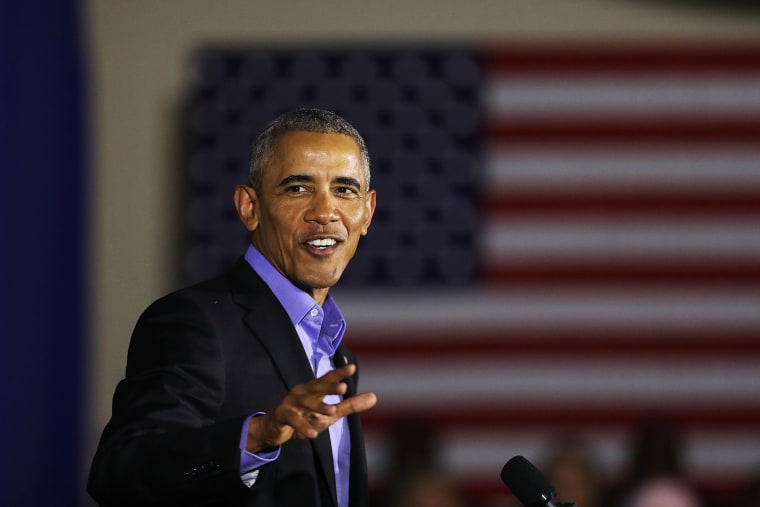It did not escape former President Obama's attention that Attorney General Bill Barr's Justice Department dropped charges against one of Donald Trump's allies -- who'd already pleaded twice in open court to being guilty.
Obama, using the kind of language he hasn't yet used publicly, participated in a call with thousands of veterans of his administration and pointed to the Michael Flynn case as evidence that the "rule of law is at risk." He went on to warn that the way in which the Justice Department dealt with the matter is emblematic of a much broader threat: this is how "democracies become autocracies," Obama warned.
The former president is hardly the only one who's noticed. The New York Times reported on this over the weekend with a headline that read, "Dropping of Flynn Case Heightens Fears of Justice Dept. Politicization."
President Trump and his supporters on Friday praised Attorney General William P. Barr's decision to drop the prosecution of Michael T. Flynn, even as career law enforcement officials warned that the action set a disturbing precedent and Democrats accused the administration of further politicizing the Justice Department.... [S]ome rank-and-file prosecutors said they saw Mr. Barr's action as politically motivated and damaging to the department's credibility.
The Times' report added that many current and former federal prosecutors across the country "cringed" and said they were "shocked" by the department's moves in the Flynn case.
To be sure, it's easy to endorse the concerns raised by Obama, prosecutors, and proponents of the American justice system. As we discussed last week, Donald Trump and his campaign team sought and received Russian assistance in 2016, and after the election, incoming White House National Security Advisor Michael Flynn quietly assured Moscow that the new Republican administration wouldn't be nearly as tough on Russia as the Obama administration.
When the FBI asked the retired general about those interactions, Flynn lied. When he soon after faced criminal charges, Flynn twice admitted, in court and under oath, that he was guilty.
Barr's Justice Department dropped the charges anyway, concluding that it cannot prove Flynn is guilty of the crimes to which he's already pleaded guilty. By most accounts, there's no precedent for anything like this in modern American history.
What's less obvious to me is when we'll collectively move past the point of "concerns" and "fears" about "risks," and start coming to terms with the fact that we've already arrived at the worst-case scenario.
In recent months, we've seen multiple examples of the Justice Department taking extraordinary steps to intervene in cases of interest to Trump, with the president's handpicked attorney general trying to steer prosecutorial decisions in ways consistent with the White House's political wishes. The result is a dynamic in which two parallel systems have taken shape: one for cases that the president cares about, in which Barr has played a direct and personal role, and another for the rest of the justice system.
A Washington Post report added a few months ago that Barr's Justice Department "has repeatedly tasked U.S. attorneys from far-flung offices to parachute into politically explosive cases," which has raised "concerns among current and former officials that agency leaders are trying to please the president by reviewing and reinvestigating cases in which he is personally or politically invested."
The article specifically referenced the attorney general's intervention in the Flynn case, which current and former officials said "seemed to be part of a new pattern of Justice Department political leadership spinning up inquiries that might help Trump and his friends and hurt their perceived foes."
In the wake of Richard Nixon's Watergate scandal, this was the nightmare scenario: a White House and its allies perverting the justice system, twisting federal law enforcement into a political cudgel to be used by a president indifferent to abuses and legal limits. It wasn't long ago that responsible officials in both parties recognized the importance of preventing such a dynamic.
And yet, here we are. Obama's assessment that the "rule of law is at risk" is correct, but by some measures, it's incomplete. The rule of law has also already been damaged by a direct assault.
Trump and Barr are unembarrassed by such developments, which reinforces the fact that we should expect them to continue to so long as they remain in office.

